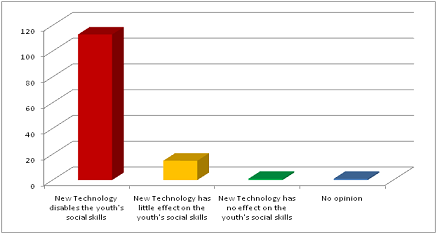
SOCIALIZE: The use of modern technology is deteriorating the social skills of the youth.
By Kate Doak, Staff Writer
Disengaged and bored, the typical 2012 teen checks his or her cell phone during a conversation with a family member. Technology has squeezed its way into the lives of the teenagers of this generation and diminished their ability to speak properly and confidently to others.
The capability to communicate through a computer screen may give people the chance to develop a clear response, but it inhibits the ability to think quickly. Critical thinking and analytical skills are declining. Sure, technology is a perfect educational aid for research and schoolwork, since it is a great place to find help and information. But what happens when an entire generation becomes dependent on social networking for communication? It results in a massive epidemic of text-obsession. Due to the increasing prominence of technology, the ability to communicate with other human beings is fading, rendering childhood traditions obsolete.
David Elkind, a childhood development expert, explains that all the necessary ways of contact before mass technological communication are all slowly starting to disappear. “For children in past eras, participating in the culture of childhood was a socializing process. They learned to settle their own quarrels, to make and break their own rules and to respect the rights of others,” Elkind said. “Now that most children no longer participate in this free-form experience, their peer socialization has suffered.” The playdates, outings and front-yard confrontations are no longer a part of everyday life for children and teens. Those all are replaced by computer games, social networking and texting. The “culture of childhood,” as Elkind explained it, is fading away and many fear that soon enough, personal communication among youths will become obsolete. Social networking itself is a problem all its own. Larry D. Rosen, PhD, professor of psychology at California State University Dominguez Hills, said that while social networking sites, such as Facebook, have their advantages, there are also many disadvantages. “Teens who use Facebook more often show more narcissistic tendencies while young adults who have a strong Facebook presence show more signs of other psychological disorders, including antisocial behaviors, mania and aggressive tendencies,” Rosen said. Using technology as a primary means of communication impacts teens not only right now, but for the rest of their lives.
This generation’s teens do not disagree. 85 percent of 130 students polled on the topic agreed that the usage of new technology is negatively impacting this generation’s social skills. Poly Class of 2012 graduate Antonella Guadarrama reflected on high school teenagers’ social skills. “I believe that technology has made face-to-face contact obsolete,” Guadarrama said. “Facebook and texting have created a problem in the way we socialize in society.” The constant typing of impersonal Facebook and text messages makes face-to-face contact, in many situations, uncomfortable and awkward.
Poly Track and Field athlete Austin Courtney (11) said, “Yes, I believe that so many teens don’t even talk face to face with people they know and it’s affecting their writing skills as well.” Meeting new people and getting out of your comfort zone seems a lot harder than it should be. Teens are bombarded with lectures and speeches by parents and grandparents, telling the youth to be more social and to go do something!
That is precisely the goal. Do not allow technology to take over your life. As summarized perfectly by Poly literature teacher Haniyya Mubashshir, “Technology should serve humans; humans should not become slaves to technology.”
